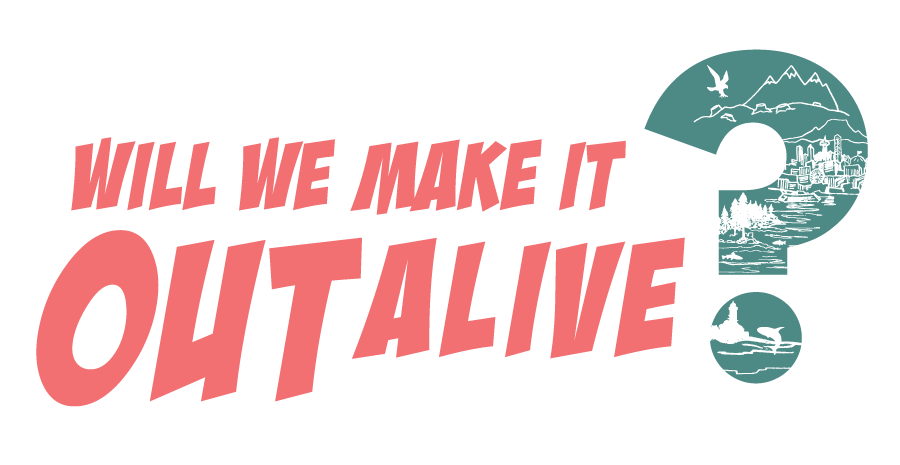S2E4: Bartering With Slugs
/Tales From A Garden Collective
Slugs were wooden barter coins. It’s all digital now, unfortunately.
In this episode we learn more about community gardens with a twist. We speak with Holli Prohaska from the Urban Farm Collective in Portland, where you don’t have to own land or even rent a community garden spot in order to participate in growing your own food, and where you may have been excited to see slugs in the past. We say, bring back the slugs!
This interview was recorded in July of 2021, so some information may be slightly out of date. Again, thank you for pudding up with our long delay in getting Season 2 ready for you! It took much more thyme than we expected.
Holli Prohaska
Holli, out and about.
Holli Prohaska is the Director of the Urban Farm Collective based in Portland, Oregon. Holli is originally from Portland, OR! She grew up in SE, went to college and worked for the Forest Service as a Hot Shot in Eastern Oregon and has lived in N and NE Portland for the last 23 years, where she still currently lives with her partner and two dogs. She is a Physical Education and Health teacher by trade and has been teaching for 20 years. She loves being involved with her community and has done a TON of volunteering with different organizations over the years. She loves gardening, hiking, biking, cooking, live music and drinking a good IPA!
Urban Farm Collective
The Urban Farm Collective is a fairly unique form of community gardening where people can volunteer at the farms and get “barter bucks” in return, which they can trade in for fresh produce or products made with items grown or raised on the urban farms, such as eggs, jams, or honey. The Barter Market is located at their Bakari Garden and is open on Tuesday evenings June through October.
This model gives people who don’t own land and either don’t want to or can’t rent a community garden space the opportunity to still play in the dirt and have a hand in growing their own food. Since land access can prevent many people from being able to garden or grow their own produce, this provides an alternative to other pay to play community garden models.
The Urban Farm Collective focuses on community building, education, and improving access to fresh and healthy food, and their goal is to grow twice as much as they need so 50% of their harvest can be donated to those organizations working to end hunger. The Urban Farm Collective provides land access; currently they operate 7 farms, located on previously vacant lots in Portland, most in formerly redlined areas, and are open to anyone who wants to participate. You can find a map of their farms here.
The collective helps protect those who farm and eat produce from the gardens by testing land for lead and other contaminants before anything is grown, and using organic and permaculture practices in the gardens. A couple of the gardens are considered food forests! Garden managers share their knowledge with apprentices, who learn the ins and outs of garden planning, growing different produce (and sometimes raising chickens or bees), preparing and improving the soil, and many other aspects of growing food. Two of the farms have been donated to the Oregon Sustainable Agriculture Land Trust (OSALT), and these lands are held in perpetuity for the purpose of education and research into sustainable agricultural practices.
What Can You Do?
Donate or lend land, or get involved in one of the gardens if you live in Portland! Holli talks about other ways people can get involved if they can’t actually garden. Some people manage their website, or even barter other tasks - a mechanic provided truck maintenance for CSA boxes! If you’d like to get involved, you can contact them through their website or stop by one of their farms during a work party.
If you live elsewhere, look for a similar program in your community, such as Hilltop Urban Gardens in Tacoma, Nurturing Roots in Seattle or GRuB in Olympia. If one doesn’t exist in your community, consider starting one!
Side Note on Redlining
We briefly mentioned historic redlining (a discriminatory practice where services such as mortgages were withheld from certain neighborhoods deemed “hazardous” to investment - often because they were non-white) in this episode. This is a complicated issue still affecting many communities today. Instead of us trying to explain it, this video made by The Root does an excellent job. Please go watch it! You can search for historically redlined areas in larger US communities using this interactive map. In a related issue, your deed may still contain racist language, and while it is illegal to enforce racist covenants, it’s only now beginning to become easier (or even possible) to remove this language.
Coming Soon!
You can’t say this cat isn’t adorable!
Please join us on Tuesday, March 1 for our next episode, which will be the fifth episode of Season Two. For our final episode of the season, we interviewed GIS Superstar Tonya Kauhi about some pretty cool volunteer GIS work she did with Hilltop Urban Gardens in Tacoma, focusing on gardening more efficiently. A whole episode dedicated to one of the many awesome uses of GIS technology? Count me in!
Please don’t forget to rate, review and subscribe on Apple Podcasts, Stitcher, or wherever you get your podcasts (like Tune In, Castbox Himalaya, iheartradio, etc). Please let us know what you think in the comments section below or on our Facebook page.
Also, if you have story ideas please feel free to share them on our Facebook or website and if you heard anything in this episode that doesn’t mesh with science and facts, please let us know and we will make a correction in a future episode.






